Related Research Articles
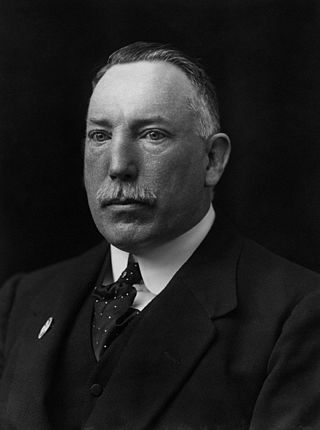
James Craig, 1st Viscount CraigavonPC PC (NI) DL, was a leading Irish unionist and a key architect of Northern Ireland as a devolved region within the United Kingdom. During the Home Rule Crisis of 1912–14, he defied the British government in preparing an armed resistance in Ulster to an all-Ireland parliament. He accepted partition as a final settlement, securing the opt out of six Ulster counties from the dominion statehood accorded Ireland under the terms of the 1921 Anglo-Irish Treaty. From then until his death in 1940, he led the Ulster Unionist Party and served Northern Ireland as its first Prime Minister. He publicly characterised his administration as a "Protestant" counterpart to the "Catholic state" nationalists had established in the south. Craig was created a baronet in 1918 and raised to the Peerage in 1927.

The Parliament of Northern Ireland was the home rule legislature of Northern Ireland, created under the Government of Ireland Act 1920, which sat from 7 June 1921 to 30 March 1972, when it was suspended because of its inability to restore order during the Troubles, resulting in the introduction of direct rule. It was abolished under the Northern Ireland Constitution Act 1973.

Northern Ireland is one of the four countries of the United Kingdom, situated in the north-east of the island of Ireland. It was created as a separate legal entity on 3 May 1921 under the Government of Ireland Act 1920. The new autonomous Northern Ireland was formed from six of the nine counties of Ulster: four counties with unionist majorities – Antrim, Armagh, Down, and Londonderry – and two counties with slight Irish nationalist majorities – Fermanagh and Tyrone – in the 1918 General Election. The remaining three Ulster counties with larger nationalist majorities were not included. In large part unionists, at least in the north-east, supported its creation while nationalists were opposed.
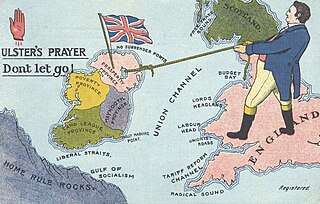
Unionism in Ireland is a political tradition that professes loyalty to the crown of the United Kingdom and to the union it represents with England, Scotland and Wales. The overwhelming sentiment of Ireland's Protestant minority, unionism mobilised in the decades following Catholic Emancipation in 1829 to oppose restoration of a separate Irish parliament. Since Partition in 1921, as Ulster unionism its goal has been to retain Northern Ireland as a devolved region within the United Kingdom and to resist the prospect of an all-Ireland republic. Within the framework of the 1998 Belfast Agreement, which concluded three decades of political violence, unionists have shared office with Irish nationalists in a reformed Northern Ireland Assembly. As of February 2024, they no longer do so as the larger faction: they serve in an executive with an Irish republican First Minister.
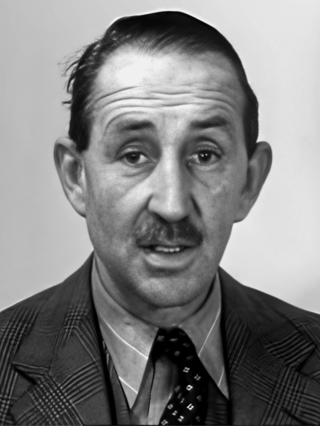
Basil Stanlake Brooke, 1st Viscount Brookeborough,, styled Sir Basil Brooke, 5th Baronet, between 1907 and 1952, and commonly referred to as Lord Brookeborough, was an Ulster Unionist Party (UUP) politician who served as the third Prime Minister of Northern Ireland from May 1943, until March 1963.
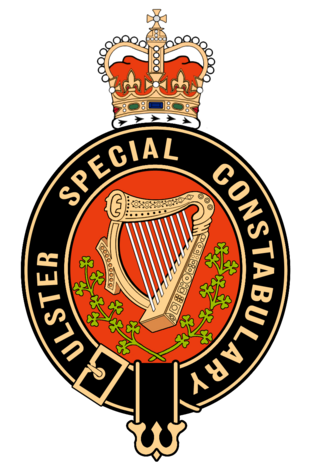
The Ulster Special Constabulary was a quasi-military reserve special constable police force in what would later become Northern Ireland. It was set up in October 1920, shortly before the partition of Ireland. The USC was an armed corps, organised partially on military lines and called out in times of emergency, such as war or insurgency. It performed this role most notably in the early 1920s during the Irish War of Independence and the 1956–1962 IRA Border Campaign.

United Ireland, also referred to as Irish reunification or a New Ireland, is the proposition that all of the island of Ireland should be a single sovereign state. At present, the island is divided politically: the sovereign state of Ireland has jurisdiction over the majority of Ireland, while Northern Ireland, which lies entirely within the Irish province of Ulster, is part of the United Kingdom. Achieving a united Ireland is a central tenet of Irish nationalism and Republicanism, particularly of both mainstream and dissident republican political and paramilitary organisations. Unionists support Northern Ireland remaining part of the United Kingdom and oppose Irish unification.

Ulster nationalism is a minor school of thought in the politics of Northern Ireland that seeks the independence of Northern Ireland from the United Kingdom without joining the Republic of Ireland, thereby becoming an independent sovereign state separate from both.
The Northern Ireland Civil Rights Association (NICRA) (Irish: Cumann Cearta Sibhialta Thuaisceart Éireann) was an organisation that campaigned for civil rights in Northern Ireland during the late 1960s and early 1970s. Formed in Belfast on 9 April 1967, the civil rights campaign attempted to achieve reform by publicising, documenting, and lobbying for an end to discrimination against Catholics in areas such as elections (which were subject to gerrymandering and property requirements), discrimination in employment, in public housing and abuses of the Special Powers Act.
Ivan Averill Cooper was a nationalist politician from Northern Ireland. He was a member of the Parliament of Northern Ireland and a founding member of the Social Democratic and Labour Party (SDLP). He is best known for leading the civil rights march on 30 January 1972 that developed into the Bloody Sunday massacre.

The Partition of Ireland was the process by which the Government of the United Kingdom of Great Britain and Ireland (UK) divided Ireland into two self-governing polities: Northern Ireland and Southern Ireland. It was enacted on 3 May 1921 under the Government of Ireland Act 1920. The Act intended both territories to remain within the United Kingdom and contained provisions for their eventual reunification. The smaller Northern Ireland was duly created with a devolved government and remained part of the UK. The larger Southern Ireland was not recognised by most of its citizens, who instead recognised the self-declared 32-county Irish Republic. On 6 December 1922, Ireland was partitioned. At that time, the territory of Southern Ireland left the UK and became the Irish Free State, now known as the Republic of Ireland. Ireland had a large Catholic, nationalist majority who wanted self-governance or independence. Prior to partition the Irish Home Rule movement compelled the British Parliament to introduce bills that would give Ireland a devolved government within the UK. This led to the Home Rule Crisis (1912–14), when Ulster unionists/loyalists founded a large paramilitary organization, the Ulster Volunteers, that could be used to prevent Ulster from being ruled by an Irish government. The British government proposed to exclude all or part of Ulster, but the crisis was interrupted by the First World War (1914–18). Support for Irish independence grew during the war and after the 1916 armed rebellion known as the Easter Rising.
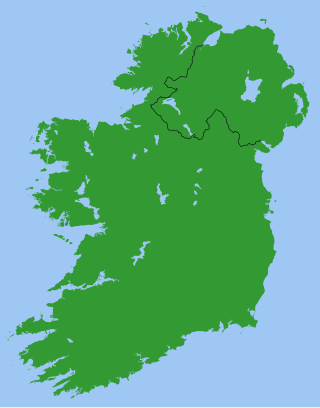
The Irish Boundary Commission met in 1924–25 to decide on the precise delineation of the border between the Irish Free State and Northern Ireland. The 1921 Anglo-Irish Treaty, which ended the Irish War of Independence, provided for such a commission if Northern Ireland chose to secede from the Irish Free State, an event that occurred as expected two days after the Free State's inception on 6 December 1922, resulting in the partition of Ireland. The governments of the United Kingdom, of the Irish Free State and of Northern Ireland were to nominate one member each to the commission. When the Northern government refused to cooperate, the British government assigned a Belfast newspaper editor to represent Northern Irish interests.
John Beattie was a Northern Ireland Labour Party (NILP) politician from Northern Ireland. He was a teacher by profession. In 1925, he became a Member of the Northern Ireland House of Commons for Belfast East. He represented Belfast Pottinger from 1929. At one point he served as leader of the NILP.
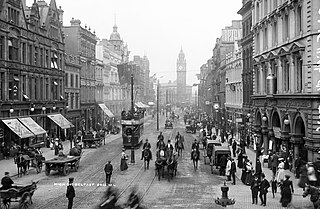
Belfast is the capital of Northern Ireland, and throughout its modern history has been a major commercial and industrial centre. In the late 20th century manufacturing industries that had existed for several centuries declined, particularly shipbuilding. The city's history has occasionally seen conflict between different political factions who favour different political arrangements between Ireland and Great Britain. Since the Good Friday Agreement, the city has been relatively peaceful and major redevelopment has occurred, especially in the inner city and dock areas.

Cahir Healy was an Irish politician.
Henry Cassidy Midgley, PC (NI), known as Harry Midgley was a prominent trade-unionist and politician in Northern Ireland. Born to a working-class Protestant family in Tiger's Bay, north Belfast, he followed his father into the shipyard. After serving on the Western Front in the Great War, he became an official in a textile workers union and a leading light in the Belfast Labour Party (BLP). He represented the party's efforts in the early 1920s to provide a left opposition to the Unionist government of the new Northern Ireland while remaining non-committal on the divisive question of Irish partition.

Sir Charles Norman Lockhart Stronge, 8th Baronet, MC, PC, JP was a senior Ulster Unionist Party politician in Northern Ireland.
Bishop Daniel Mageean D.D. 6 May 1882 – 17 January 1962 was an Irish Roman Catholic Prelate and until 1962 he held the title Lord Bishop of Down and Connor.

Sir Richard Dawson Bates, 1st Baronet, known as Dawson Bates, was an Ulster Unionist Party (UUP) member of the House of Commons of Northern Ireland.

The Troubles of the 1920s was a period of conflict in what is now Northern Ireland from June 1920 until June 1922, during and after the Irish War of Independence and the partition of Ireland. It was mainly a communal conflict between Protestant unionists, who wanted to remain part of the United Kingdom, and Catholic Irish nationalists, who backed Irish independence. During this period, more than 500 people were killed in Belfast alone, 500 interned and 23,000 people were made homeless in the city, while approximately 50,000 people fled the north of Ireland due to intimidation. Most of the victims were Nationalists (73%) with civilians being far more likely to be killed compared to the military, police or paramilitaries.
References
- ↑ The Times,"Dread of Nocturnal Visits " In Ulster 20 February 1939; pg 19; col C
- ↑ Vol. 16, page 1095 original text online; downloaded February 2010 Archived 3 March 2016 at the Wayback Machine
- ↑ Discrimination - Quotations, CAIN
- ↑ Jonathan Bardon, A History of Ulster (Blackstaff, 2005), pp. 538-9.
- ↑ R Fanning, Sunday Independent December 2009
- ↑ See: Ferriter D. The Transformation of Ireland 1900-2000 London: Profile Press 2004, p.281; ISBN 1-86197-307-1. Buckland P., The Factory of Grievances: Devolved Government in Northern Ireland 1921-1939 New York: Barnes & Noble; Dublin: Gill & MacMillan 1979, p.72 ISBN 0-06-490752-X. Cronin S., Irish Nationalism: A History of its Roots and Ideology New York: Continuum, 1981; p.177 ISBN 0-8264-0062-0. Tierney M., Modern Ireland 1850-1950 Dublin; Gill and Macmillan, 1978; p.230. ISBN 0-7171-0886-4.
- ↑ "Ulster's Prime Minister replies to his critics"; 28 April 1967; The Times, pg 11 col E
- ↑ "Paradox of political reform at Stormont (News)"; Hugh Munro; The Times 8 November 1971; pg 12 col F
- ↑ "Mr Whitelaw denies that Army's hands are tied in military action against Northern Ireland gunmen (News)"; The Times 12 October 1972; pg 6 col A
- ↑ "Sectarianism in Ulster (Letters to the Editor)" BRIAN W. WALKER,, NORMAN GEAR, The Times 1 June 1973; pg 15 col E
- ↑ "Unionists cry foul at Stormont football fixture (News)", The Times, 4 August 1984; pg 1 col B